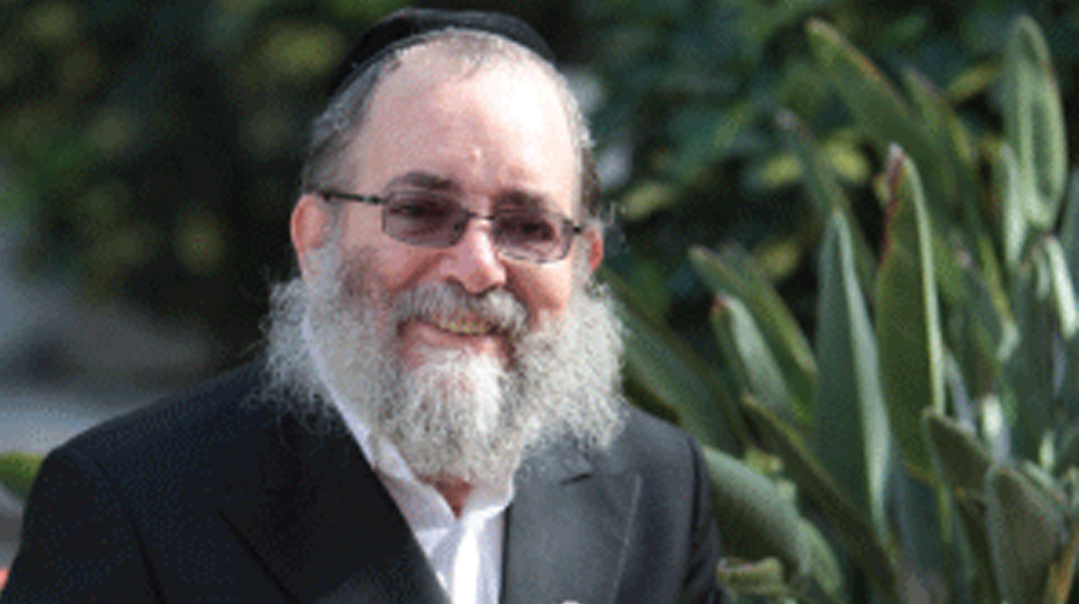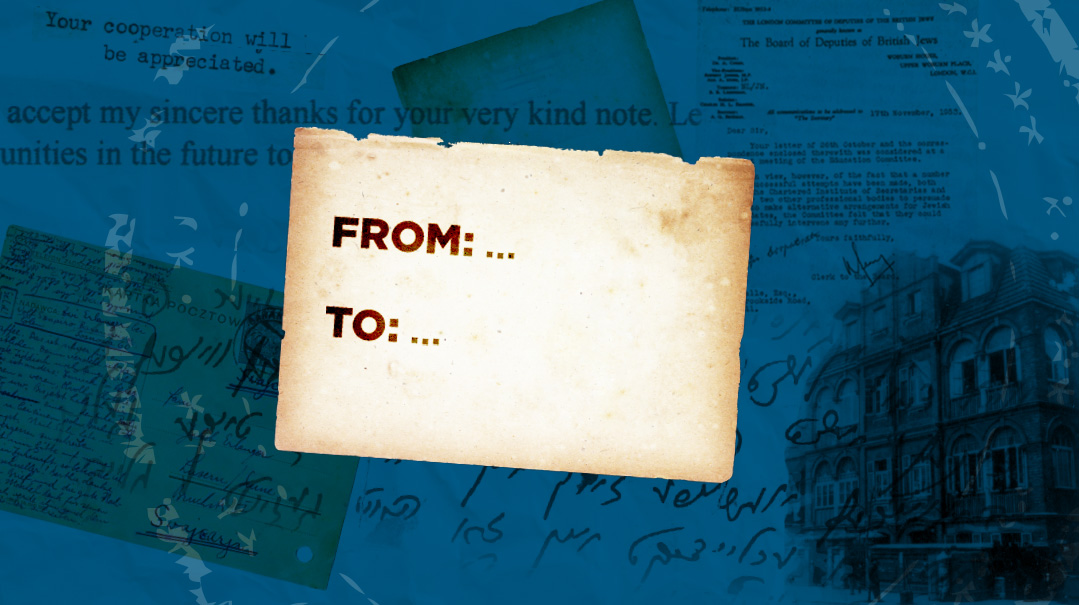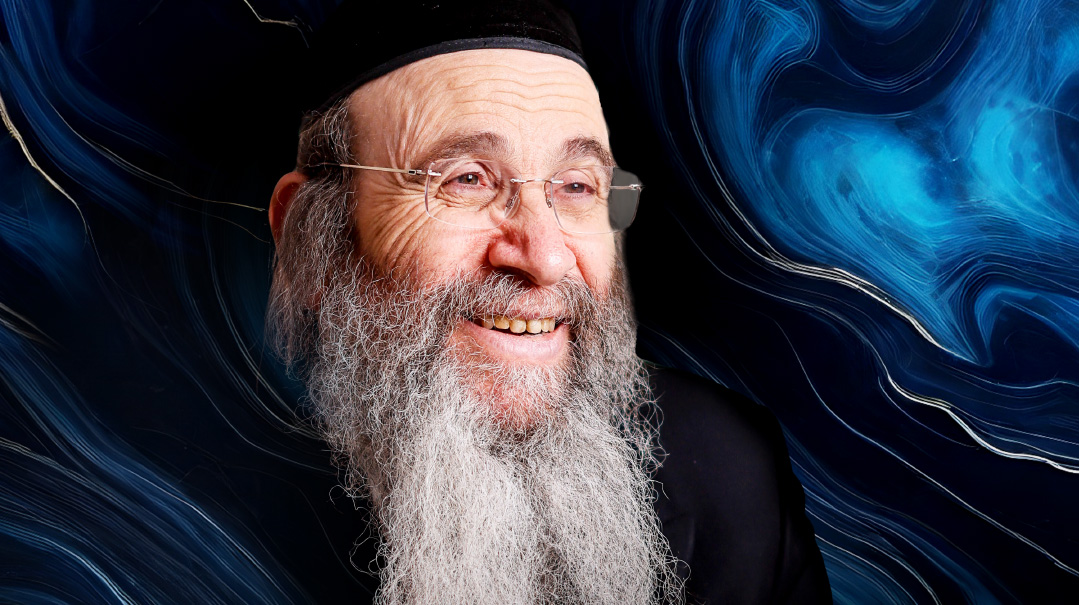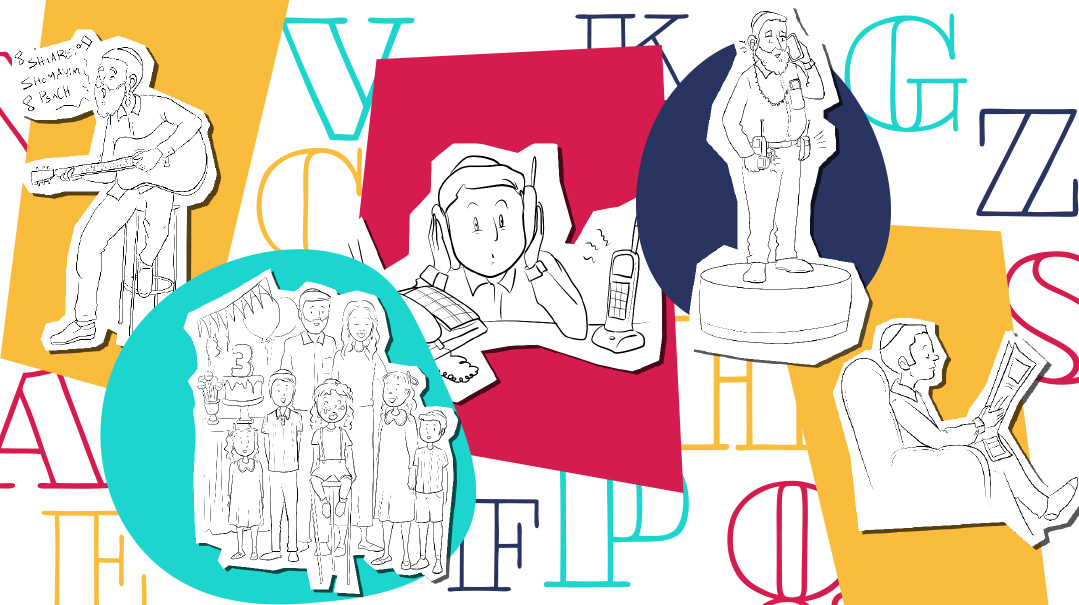Throw Away the Crutches


A
haron Margalit has a message to bring to anyone who wants to hear it. At its core is rejection of self-pity and for this generation that’s a hard thing to let go of. After all we’ve been bombarded all our lives with messages that we deserve a constant flow of ease convenience and delight and when that flow is disrupted there’s always something to swallow or a button to push to get it flowing again. Only sometimes there isn’t … and what’s left then but righteous indignation venting and self-pity?
But Aharon Margalit has an unusual set of credentials. When he says to stop pitying yourself and take charge of your life you can’t brush him off as another slick motivational speaker who doesn’t understand what you’re going through.
Many have already read his autobiography As Long As I Live or the original Hebrew version Ethalech written for Reb Aharon by Moshe Gutman — and others already know the bare bones of the story: Aharon Margalit was two-and-a-half years old playing blissfully in a sandbox outside his home in Moshav Tifrach when his life of ease abruptly ended. A young fellow on a mock rampage in the moshav’s new tractor frightened the toddler so badly that he lost his power of speech. Shortly afterwards he contracted polio which nearly killed him. He spent two months in an iron lung on the verge of death his little body atrophying as the days and weeks progressed. Left paralyzed he spent five years in an institution for severely disabled children in Jerusalem far from his home in the Negev. Travel conditions in those days made visits very difficult so he rarely saw his parents. When he eventually managed to speak again he stuttered terribly for years. His disabilities made him a target for bullies.
As an adult he fought deadly malignant tumors three times and was given six weeks to live. He faced the loss of loved ones before their time including his newlywed son Chaim killed by drunken thugs while he and his wife were visiting Havana Cuba. In short his life has been a series of struggles that no one would wish on his worst enemy.
And although it’s improbable that all these things could happen to one person somehow people come away feeling that Reb Aharon’s story has something to do with them. The clichéd catchword “inspirational” won’t fit; they call it “life-changing.” Had it been otherwise Reb Aharon wouldn’t have agreed to make his story public.
So much has been written by and about people who overcame formidable challenges through prayer faith and fortitude. All this applies to Aharon Margalit as well but he places a special emphasis on a person’s obligation to take positive action as long as he’s still alive and aware. His story proves that he won’t allow emunah to serve as an excuse for passivity or for blaming one’s troubles on G‑d.
Rav Margalit doesn’t come across as the scarred individual described in the book’s blurb. Despite multiple surgeries for cancers that afflicted his face, there are no noticeable marks. He has the pure-eyed look of a devoted chassid, and his neat, matte black garb fails to muffle the glow of inner power that radiates from his rather small figure. There is no sign of his former paralysis as he steps forward. His manners are gallant and this former stutterer’s Hebrew is mellifluous, so fluent and perfectly cadenced that he might be an announcer on some easy-listening radio program. This may be the result of careful speech training, years on the lecture circuit, giving shiurim in the kollel he opened, and serving the clientele in his insurance business. Yet for all the cultivated worldliness of his speech, as you listen to him you feel you’re being gently lifted to a higher plane of existence. Throw out the stereotypes, and welcome to the custom-made world of Aharon Margalit.
What Will Crying Help?
Was Reb Aharon born immune to self-pity? He says no, that there were times when he felt very sorry for himself indeed; a little boy huddled under a blanket in a sanatorium, all alone, paralyzed from polio, locked into a world of silence.
“I remember it clearly, the turning point, when I was seven years old; it was Rosh HaShanah. I was lying in my bed in the home for disabled children, and the room was filled with the friends and relatives of the other children. There were gifts and flowers and cakes, and happy voices saying ‘Shanah Tovah,’ and I was lying under my blanket, crying my heart out — that’s how I learned to spend every Shabbos since I was three. I thought of my family at home, how I missed them … and I was full of complaints: Why did I have to get traumatized by the tractor and also get polio — all in one week? There were plenty of other kids in Tifrach — why was it all reserved for me? And why did HaKadosh Baruch Hu kill all my aunts and uncles, cousins, grandparents, so there’s no one to come visit me? And why do my parents live so far away, in Tifrach, and my only uncle lives there, too? And what’s going to be with me — will I ever get out of here? Will I ever be able to move any of my limbs? Will I ever be able to get around in a wheelchair, at least?
‘Why, why, why, why…’ I cried bitterly.
“But after a while — it was a great chesed from the Borei Olam — a thought came to me: This is the reality of your situation. You were left paralyzed by polio. You cannot speak. Is crying going to help? Will it change the facts? Maybe it would be better if, instead of crying, you tried to think of something that you can do for yourself, even in this situation?”
A seven-year-old boy, in a situation that would make anyone cry, had an insight like that?
“Maybe it was because I couldn’t speak, so I lived in a world of thought. I was highly developed in that way.”
That flash of thought, that Rosh HaShanah gift from Shamayim was the turning point in Aharon Margalit’s life. The thought took root and became a firm principle:
“Anybody, in any situation, can do something. There’s no moment in life when a person can’t somehow help himself — on one condition: that he stop feeling sorry for himself. He has to get out of that ‘poor me’ mode and stop complaining. Once he stops that, and instead starts thinking, ‘what can I do,’ and he adds a tefillah to the Borei Olam to give him the intelligence to come up with an effective idea, he’ll gain every time. Because ‘the way a person wants to go, he is led …’
Keep On Thinking
Reb Aharon, a Kretchnif chassid who lives in Rechovot, began applying this principle when he was still a youngster. He sweated through grueling speech therapy sessions with a creative teacher who used guided imagery to help him overcome his handicap, and he was so determined to walk without crutches that he used a system similar to bio-feedback to coax his neuro-muscular system to heal.
He pulls out one story after another to show how his never-give-up principle applies, even in the throes of death.
“There was a story some years ago about two Israeli fellows in their 40s who decided to trek through India, like the younger people do after the army. Their friendship held up through all the stresses of the trip for two and a half months, until one day they came to a narrow pass between two low mountains. One of them — let’s say his name was Rafi — got it into his head that they should go rappelling. His friend said ‘mah pitom’ to that, and after an argument they parted ways. Left alone, Rafi was still determined to go rappelling down the mountainside. He put on his gear, stuck a peg into a crack in the mountain, and started down. He was only two or three meters from the bottom when he noticed that the rope was coming loose. He thought he’d better jump before the rope let him drop — but what he didn’t see from up there was the pit he was jumping into. He had good boots on and he wasn’t hurt … only he was now stuck in a pit six meters deep, three meters wide.… He looked up, hoping to find a foothold, and saw to his horror that it wasn’t just the peg coming loose, it was an enormous chunk of rock that was pulling away from the mountain and about to fall … right onto him. There was nowhere for it to fall but into that pit, and escape wasn’t an option. What would most people do in that situation? Cower with their arms covering their head, maybe cry out Shema Yisrael … but as Rafi watched that boulder teetering on the brink, he kept his wits, took paper and a pen out of his pack, and quickly wrote, ‘I am buried under the boulder.’ He found a small stone, wrapped the paper around it, and threw it out of the pit, so that when a search party came to look for him they would see it and know where to find his body. He couldn’t save himself, but thanks to that note, he was brought to kever Yisrael. Thanks to that note, his wife was spared from being an agunah. In those last seconds of his life, instead of just waiting for death, he did something very beneficial for himself and his family.
“If a person can just keep thinking and not go to pieces.…” muses Reb Aharon. But how does a person extricate himself from self-pity and hysteria? Is there a trick to it?
“It’s all in the mind,” says Reb Aharon. “People go around with a big sack of troubles on their heads, and they go from rav to rav, from rebbe to rebbe, explaining how unfortunate they are. They’re looking for a hechsher for their self-pity. But what they really need is to take that sack off their heads and throw it down — and give it a good kick, too. Because that sack is keeping the healing rain and sun from reaching them; it’s been keeping them bent over, more and more self-absorbed with their troubles. So a person must take off that sack, kick it, step on it, stand on top of it. And then, straighten up and look forward. Okay, so I had a mother like this and a father like that, and teachers like those, and I was traumatized, and I got sick … all very true! Now, seeing that this is the case, do I choose to wallow in it for 70 years? What can I do to help myself — despite what has happened to me?”
This summer, Rav Margalit came home one night and found among his e-mails a message from a lady who wrote to say how much she’d appreciated As Long As I Live. She went on to tell him about her 14-year-old son, Moishy, who is disabled with a serious muscular illness. It affects mainly his lower body; he manages fairly well with his arms, and his mind is very sharp. He was an eighth-grader in a local Talmud Torah, but for two months he’d been staying home. Moishy was depressed, his mother said, because despite his good scholastic record, he couldn’t find a yeshivah that would accept him. Logistical problems, such as a lack of elevators, stood in the way of catering to his special needs. Moishy couldn’t take it anymore, she wrote, because one after the other, all his classmates were coming in jubilantly announcing where they’d been accepted.
“It was 3 o’clock in the morning, but I felt very connected to Moishy’s distress, and something moved me to reply directly to him. I told him he should thank Hashem for blessing him with such caring, dedicated parents. Not everyone is so fortunate. ‘But Moishy,’ I wrote, ‘the holy Torah commands us, uvacharta bachayim. We have to choose life, and that means we have to do hishtadlus. Forgive me, Moishy, I know that what I say might be painful, but I feel I must say it: A person doesn’t fulfill his obligation of hishtadlus through his parents. You must also do something to improve your situation. Moishy, if you’ll stop pitying yourself, stop telling everyone how bad you feel and how terrible your situation is, and despite how bad you feel, start looking at the situation objectively and say, ‘This is the reality, now what can I do about it?’ — and pray from the bottom of your heart to the Borei Olam that He should give you the wisdom to choose a helpful course of action, a way will open up for you.
Unfortunately I can’t offer suggestions about what to do, since I don’t know your community. But I can promise you that if you start thinking in this direction, HaKadosh Baruch Hu will help you. Moishy, please don’t throw this letter in the garbage, and don‘t be angry with me; I’m writing to you from the depth of my heart. I have a lot of experience, Moishy. Please read this again in a week’s time, and again a week later — and you’ll see that there is something in what I say.’
“I signed it and sent it off. I heard nothing from the family until right before Rosh Chodesh Elul, when my phone rang at 6:15 a.m. as I was on my way to shul — a call from overseas. It was Moishy’s mother, laughing and crying. She said they’d been very excited to get my reply on the same day they’d written to me … and that Moishy had indeed been very offended by my letter. ‘I thought he was a tzaddik,’ Moishy fumed, ‘but I see he has no heart. Now that he’s famous, he forgets what it’s like to suffer … Instead of understanding that I’m sick and need help, he gives me mussar and tells me to take care of my own problems.’ And he threw the printed message away. An hour later she went to take the letter out of the wastebasket, but it wasn’t there … someone had already retrieved it.”
Moishy’s mother continued her story. This I what she told Rav Margalit:
“I just got a call from the rosh yeshivah of the place Moishy wanted most to go to. He said that on Motzaei Tisha B’Av a friend of Moishy’s had come to him, bringing him a letter and a gift from Moishy — a copy of As Long As I Live, which he bought with his own pocket money.”
The gist of Moishy’s letter was, “I’m sending you this book about a man who was more disabled than I am, and Baruch Hashem, he got well, because he was determined to get well. B’ezras Hashem, I will also overcome my disability. Aharon Margalit is a famous man now; I will also be a famous man. B’ezras Hashem, I will be one of the gedolim of the next generation. You can help to turn my vision into reality. If you’re zocheh, you’re zocheh, and if not, HaKadosh Baruch Hu has many ways.”
The letter and the book hit their target, bull’s-eye. “Tell me,” the rosh yeshivah asked the mother, “is your son still available? Yes? Please, let me have him. I don’t want any tuition, I just want to be the one who helps him make his dream come true.… I will take care of his ruchniyus and gashmiyus, he will come on all the trips, I will push his wheelchair, I’ll carry him on my back.… Our dorm rooms are upstairs, so I’ll build a room for him on the ground floor … my son has already agreed to share the room with him and help him at night Please, send him to me.…”
Reb Aharon pauses. “Look at what a 14-year-old boy can do when he decides to stop feeling sorry for himself and do something. This boy was depressed? This is a young lion! A boy who could write a letter like that to a rosh yeshivah? So even when they say someone is depressed, sometimes you just have to push the curtain aside and see who’s really there.”
Reb Aharon says a person can advocate for himself even up to his last breath. “Last spring,” Reb Aharon recalls, “a lady called me about her husband, Reuven, who was very ill. We’d been davening for him.”
She asked if Rav Margalit would be so kind as to come and say some words of encouragement to her husband and the family, as they were emotionally shattered. For three weeks Reuven had been shut up in his room. He wasn’t going to shul, wouldn’t see any visitors, and wouldn’t even let his wife in. She would leave his meals by the door, and he’s deposit the tray there when he was finished. He would go out only to the hospital for treatments, because his wife drew the line there — if he wouldn’t cooperate on that, she threatened, she would leave the house and he’d be left there alone.
“When I arrived, Reuven came out and sat in the living room. All the children were there, and the married children’s spouses too. He told me how a year ago he’d felt something was wrong, but out of fear of bad news, he hadn’t gone to have it checked out. Only nine weeks ago, when he felt it was getting worse, he’d gone to the doctor, and two weeks later the biopsy results confirmed that he had a malignancy. It had spread, and the doctors were very pessimistic. He was going to Tel HaShomer for chemotherapy every afternoon, but he knew he couldn’t expect to live much longer. It was a matter of days, he believed, and he was just shutting down, making a slow exit from this world. He didn’t feel like facing anyone; he just wanted to die quietly — one day his wife would knock on his door, get no answer, and find he was gone. For more than an hour, I tried to talk to him, but he was adamant that he wouldn’t leave the house. Finally I said, ‘Reuven, can I speak openly to you? You’re known around town as a smart man….’
‘All right,’ he said.
‘Reuven, I’m sure that b’ezras Hashem you have many years still ahead of you,’ I began, even though I knew he was deathly ill. ‘So if you want to spend a few days in your room, alone, I have no problem with that. But according to your thinking, assuming you only have a day or two left to live, do you want to spend those hours lying in bed? Are you thinking straight? What about doing something useful?’
‘What, for example?’ he said, beginning to smile a little, with that black humor that only the shadow of death brings out in people.
‘What you’re doing now,’ I said. ‘But maybe you could give a smile that shows your teeth?’ He gave a full smile. (Getting sick people to smile is helpful in itself.) Then he asked, ‘And how is it useful if I smile?’
‘Well,’ I said, ‘If you go to the Olam HaEmes with a smile on your face, they’ll put you in the section for happy people, and that’s where you’ll be forever. And if you go there all depressed, they’ll put you in a ward for the mentally ill, and that’s where you’ll be forever. Where would you rather be?’ He smiled again — that was already two smiles I got out of him — and he asked, ‘What could I do, for example?’
‘Reuven,’ I said, ‘isn’t there anyone in the world that you’d like to thank? Isn’t there anyone you want to ask to forgive you? This is your last chance, according to you! Maybe there’s something you’ve always wanted to say to your wife, but you felt too awkward … maybe you could say goodbye to the children, say some final words to each one of them?’
“That evening, I went to give a lecture. I was just about to turn off my cell phone when Reuven’s wife called. She told me they’d gone to Tel HaShomer that afternoon and done the usual blood test to see if he could take the chemotherapy. They’d found that he couldn’t.
“The doctor told them Reuven’s systems were shutting down. It was time to call the children. On Thursday towards evening, Reuven passed away.
“On Sunday my wife and I went to be menachem,” Rav Margalit continues. “Reuven’s wife said to me, ‘Reb Aharon, let me tell you what happened. Thursday morning Reuven told me, ‘tell the children to come.’ One of them had stayed all night and had just gone home. ‘Tell him to come back,’ he said. ‘He’ll have time to sleep later.
“She told us that Reuven spoke with each of the children for 20 minutes. He asked each of them to take one mitzvah and keep it with great hidur no matter what, and this would be l’iluy nishmaso. Each one cried and shook hands to seal the promise. He spoke with her for more than an hour. Then they all talked together.
“They cried, they hugged and kissed, they said goodbye and cried some more.… In the afternoon his pains got worse, they put him to sleep to stop the pain, and late in the day he passed away.”
The widowed woman turned to Rav Margalit and said, “Reb Aharon, if he had died in that room with the dishes outside, they would have had to put me in a madhouse. I never, ever could have forgiven myself for allowing that to happen…. Yes, we’re very sad to lose him, but at least we said goodbye, at least we have closure.…”
Reuven got his act together and made the last hours of his life a time to be remembered with tears of love.
“There is no moment in life,” Reb Aharon repeats like a mantra, “when a person cannot do something beneficial.”
R
av Aharon Margalit, the man who grabbed hold of life and wouldn’t let go, has a pet, multifaceted project, aptly named Mifal Chafetz Chaim. Founded in 2000, it was the brainchild of Reb Aharon’s son, Reb Baruch, who felt something should be done to counter the intifada. ‘How about having people do tests on shmiras halashon?’ he suggested to his father. They launched the project in Ashdod in the form of monthly tests for men — anyone who wanted to come would sit and do an open book test on Chafetz Chaim and Shmiras HaLashon, and whoever scored 85% or more received a small stipend.
“We figured maybe a hundred people would come,” Reb Aharon relates, “and I agreed to cover the cost. We weren’t prepared for what happened; that first night more than 400 people came. All evening we were running back and forth photocopying more tests.”
The program quickly expanded to include other seforim on mitzvos bein adam l’chaveiro and more locations. But Reb Aharon couldn’t meet the budget, and he also wanted women to participate, so he and his son came up with the idea of distributing take-home tests, to be dropped off at special collection points, and raffling off prizes among the high scorers.
“We gave out small prizes every month, along with a grand prize of 1500 shekels, and a second prize of 1000 shekels. At the same time we started tests in Mishnah Berurah as well. We started a newsletter called Kav v’Naki, including sections for children and adults, comics, sh’eilos and teshuvos. In Israel we print up 10,000 copies and distribute them, and anyone who wants can sign up to get it by e-mail,” says Rav Margalit.”
That was only the beginning. Some ten years ago, Reb Aharon was pondering the fact that despite all the talk about mitzvos bein adam l’chaveiro, we don’t necessarily see much improvement in this area of inter-human conduct.
“The idea struck me that this may be because most rabbis aren’t really fluent in these dinim, and people hardly come to ask sh’eilos in these matters.”
What was needed, Reb Aharon felt, was a kollel to train rabbanim and actually give them smichah specifically in mitzvos bein adam l’chaveiro. This was not a simple project to launch, as the gedolim were reluctant to endorse such an innovation.
“But I still felt it was a great idea. Finally, I came to Rav Moshe Halberstam ztz”l together with Rav Meyer Schreiber, of the vaad shmiras halashon of Kollel Vizhnitz, and Rav Moshe was very excited about the idea. He said we would come up against obstacles, but if we succeeded, it would bring about a revolution in Am Yisrael.
“He advised us to take yungermen who were at least 30 years old, had finished Choshen Mishpat, and who were exemplary in their own conduct bein adam l’chaveiro.
“When I asked Rav Moshe if he would agree to be nasi of the kollel, he smiled and said, ‘You know I live in Meah Shearim, and I told you you’d have a lot of opponents.…’ but then he agreed. He said for this idea it was worth getting his windows broken.”
The kollel opened in 2006 in Rechovot under rosh kollel Rav Daniel Orlanchik. Rav Moshe Koifman of Bnei Brak, the author of many commentaries on Chafetz Chaim, compiled a learning program for the kollel, and he tests the yungermen.
Rav Margalit gets special nachas from the phone line set up for sh’eilos bein adam l’chaveiro. “We get calls from Sydney, Boro Park, Antwerp, London — everywhere. In Kiryat Sefer there is a beis horaah where you can get a psak halachah bein adam l’chaveiro on Sunday evenings. In Rechovot I sit as the mazkir beis din and I get nachas just from the amazing things people come to ask.”
Reb Aharon remembers the two brothers-in-law who came in to settle a dispute. They had been in a financial dispute, and now one of them was marrying off a child — and the other refused to come to the wedding. “Pay me the money you owe if you want me to come,” he said. “But I’m patur,” said the other. “And if you don’t come you’ll cause pain to your sister and your in-laws.”
“So they came, together, to ask if he has to come to the wedding. The beis din ruled that not only must he go to the wedding, but he must bring the same gift he would give to any of his nephews and nieces, and he must dance just as joyfully — if not, he would be guilty of the transgressions of bearing a grudge and taking revenge.”
(Originally featured in Mishpacha, Issue 436)
Oops! We could not locate your form.












